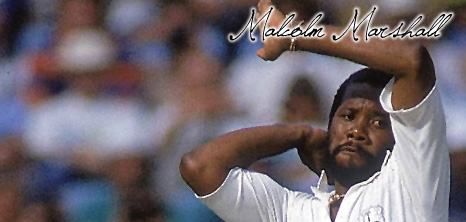|
Malcolm MarshallA clear indication that height is not always relevant to what a person can offer, Malcolm Marshall has certainly defied the odds based on what the cricketing world in Barbados and across the globe have grown to know. Seen as being 'short' in height by his teammates, Malcolm was a tower or power with his 5'9" build that proved quite dangerous to his cricketing counterparts.
Deemed as the greatest fast bowler at test level with the West Indies team and also at county level with Hampshire, Marshall made his Test debut on the 1978-79 tour of India at the age of 20. His rather athletic sprint towards the wicket, his physically intimidating deliveries, his magnificently controlled outswing and his natural balance all proved quite devastating to his many opponents.
Born on April 18, 1958 in Bridgetown, Barbados Marshall played cricket for the West Indies from 1976 to 1991 and held the record as its leading wicket taker, at 376, until Courtney Walsh passed the mark in November of 1998. He also took 157 wickets in one-day internationals and more than 800 for his English county side, Hampshire.
Marshall's interest in cricket developed when he was a very young child. This interest stemmed from the tragic lost of his father to a road accident that caused him to spend time with his grandfather where he developed cricketing skills. He started out as a batsman but soon discovered a greater ability within. After playing his first-class match for Barbados, he went off to India where he made his test debut in Bangalore.
March of 1983 was seen as his first really dominant Test performance which occurred at Port-of-Spain when he took 5 for 37 against India. 1983-84, he was the principal avenger for the World Cup final defeat by India, taking 33 wickets in a six-Test series which the West Indies won 3-0.
On the 1984 tour to England, Marshall was undeniably the finest fast bowler in the cricketing world, his athletic stride and exactitude sent a wave of absolute depression throughout the English camp. This was especially evident at Headingley, where despite the handicap of his broken thumb, he graced the field by coming out to bowl with his hand in pink plaster. He then proceeded the English batting order in the second innings to finish with 7-53. Further greatness was seen again when Marshall also showed great strength of character when he batted at number 11 in West Indies' first innings despite his injured thumb. His determined innings allowed his team mate Larry Gomes to complete an unbeaten century.
In the 1988 tour of England Marshall another great performance was seen at Old Trafford on a wicket prepared specifically for spinners where he took 7 for 22. 35 wickets at an average of 12.65 were the astonishing bowling figures that he ended on.
In seven successive Test series from 1982/83 to 1985/86 he took 21 or more wickets each time, in the last five of them averaging under 20. His most productive series in this period was the 1983/84 tour to India, when he claimed 33 wickets as well as averaging 34 with the bat and making his highest Test score of 92 at Kanpur. A few months later he took five in an innings twice at home against Australia.
In 1991, at the age of 33, Marshall retired from Test cricket after the Oval Test match of the tour to England, having taken 376 Test wickets at an average of 20.94. During the 1992 World Cup, he made his final international appearance for the West Indies but still continued to play for Hampshire in the English county championships and provential cricket for Natal in South Africa.
In 1996 Marshall became coach both of Hampshire and West Indies but during the 1999 World Cup he announced the sad news that he was diagnosed with colon cancer. This diagnosis compelled him to seek immediate treatment that was unsuccessful. He returned to his homeland Barbados, where he died on November 4 at the age of 41.
In His MemoryThe memory of Malcolm Marshall is one that will live on for a long time in the minds of the people of Barbados and the rest of the world. Gone but not forgotten as we see the likes of the Malcolm Marshall Trophy which was inaugurated in his memory. A trophy that came into being to be awarded to the leading wicket-taker in each England vs West Indies Test series.
The Malcolm Marshall Memorial cricket games are also played in Birmingham, England and the Marshall Drive is named such in memory of both Malcolm and another West Indian Hampshire great, Roy Marshall.
|
|||||||||||||||||||||||||||||||||||||||||||||||||||||||||||||||||||||||||||||||||||||||||||||||||||||||||||||||||||||||||||||||||||||||||||||||||
|
|
 |
